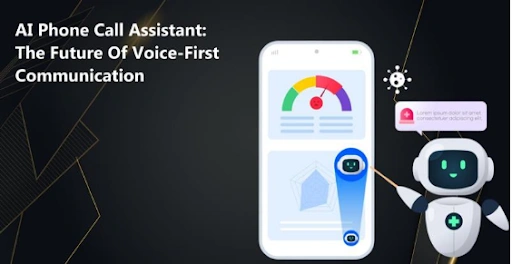
AI Phone Call Assistant: The Future of Voice-First Communication
People these days want answers right away and don’t want any trouble getting them. No one likes being on hold forever or having to repeat themselves to different people. That’s why the AI Phone Call Assistant is so great. They’re smart and make phone conversations quick, accurate, and more personal. By using things like Voice AI and Conversational Bots, companies can now offer support all the time while still keeping a friendly, personal feel.
Table Of Content
- What is the AI Phone Call Assistant
- The Journey of Voice-First Communication
- Core Features of an AI Phone Call Assistant
- Business Benefits of Using AI Phone Call Assistants
- Customer Benefits
- AI Phone Call Assistant vs. Conventional Support Systems
- The Technology Powering AI Phone Call Assistants
- Real World Applications
- Challenges and Considerations
- The Future of AI Phone Call Assistants
- Final Thoughts
As voice interaction gets more popular, how brands talk to people is changing fast. Lots of folks find it easier to just ask questions out loud instead of typing or sending emails. Because of this, AI phone assistants are in a spot to do really well.
What is the AI Phone Call Assistant
Individuals need answers quickly and conveniently when calling a business. Nobody enjoys being on hold or having to redo something. That’s where an AI Phone Assistant can help you. It’s an intelligent device that streamlines phone calls to be faster and more intimate. With technology such as Voice AI and chatbots, businesses are now able to provide assistance around the clock without sounding mechanical.
Since voice is becoming the phone activity everybody wishes to engage in, the manner names communicate changed. Instead of pecking at keyboards, it is more convenient for a lot of people to just ask their inquiries. This is great for AI phone assistants. An AI Phone Assistant is an intelligent assistant that answers calls and communicates with customers in real-time. It actually listens and understands you, then communicates just like a human being, as opposed to those old automated systems where you would have to punch numbers.
It uses Voice AI to hear what you say and employ chatbots to answer different questions, like asking for orders or offering help with technical problems. The phone assistant may also be taught to sound like a brand sounds, so every call will feel like home.
Most shops see AI Call Assistant as the core of how they work and not something extra. It eases human agents, solves issues faster, keeps customers satisfied and saves them money.
The Journey of Voice-First Communication
Today, customers demand instant response and simple communication. No one has time to hold on or repeat themselves to several individuals. That’s where AI Phone Call Assistants step in; they are intelligent tools that enable fast, precise, and personalized phone calls. Using hip technologies such as Voice AI and Conversational Bots, businesses are now in a position to provide round-the-clock support without sacrificing that human touch.
As talking is turning into a source of connecting, the way companies originally talk to people has altered. Numerous ones would simply like to state what they need instead of typing or sending an email. And for this, AI phone assistants have been a gigantic success. An AI Phone Call Assistant is simply a smart tool that receives calls, understands what is happening, and addresses customers in an instant. Unlike those old automated systems where you have to “Press 1” or “Press 2,” this AI hears what you are saying, understands it, and answers like a human.
It utilizes Voice AI to hear you out and Conversational Bots to address all types of questions, including inquiring about an order or requesting technical assistance. Technology like this even learns to act just like your brand so that every client has a similar experience.
A lot of companies nowadays view AI Call Assistants as a standard, and not an add-on. It frees up some of the workload from human agents, does the work quicker, makes customers happier and cheaper.
Devices did not just revolutionize and start talking overnight. It developed over the years:
- Manual Operators – Human beings would patch calls manually.
- Basic IVR Systems – Automated voice messages did the bare minimum.
- Automated Replies – Calls found the right number based on simple voice instructions.
- AI Integration – Now they get challenging questions in real time.
Current AI Phone Call systems are the coolest thus far. They don’t just listen to you; they hear what you say, remember things, and tailor their reply to suit the way you say it. Such seamless, natural conversation is why talking is the future of engaging with customers.
Core Features of an AI Phone Call Assistant
Despite the features of different features in providers, they offer the following fundamentals that you can expect:
- 24/7 Availability – Prepared to accept calls 24/7, weekends, and holidays.
- Natural Voice Interaction – Speak naturally like with a human, not a machine.
- Multilingual Support – Can serve clients in different languages.
- Real-Time Transcription – Provides real-time conversation translation for documentation.
- Smart Call Routing – Automatically directs complex cases to the suitable human agent.
All these features render an AI Call Assistant a trustworthy ally in customer trust management and general communication success.
Business Benefits of Using AI Phone Call Assistants
Converting to an AI-based telephone system holds multiple advantages for businesses:
- Decreased Operating Costs – Minimize dependence on massive groups without sacrificing service quality.
- Efficacious Call Management – Manage peak calls without waiting time.
- Enhanced Service Quality Consistency – All customers are given an equal amount of professionalism.
- Increased Productivity – Human representatives can focus their time on cases needing empathy and problem-solving capabilities.
- Increased Data Insights – Call analysis is used to improve future service delivery.
Companies that use AI Phone Call Assistants are usually found to see an improvement in customer satisfaction and worker efficiency.
Customer Benefits
- Instant Responses – No waiting or call transfer.
- Personalized Conversations – AI remembers customer history and personal preferences.
- Anytime Support – 24/7 availability, even post-office hours.
- Clear Communication – Easy-to-understand responses with no technical lingo.
- Seamless Human Handover – Smooth handover to a live agent for severe issues.
AI Phone Call Assistant vs. Conventional Support Systems
Traditional call centers are prone to being dependent on groups of agents operating in shifts. While there is high human interaction, it also has limitations of lengthy waiting times, restricted accessibility, and higher costs.
In contrast, an AI Phone Call system can process many calls at once, respond in an instant, and ramp up and down as necessary without a payroll expense increase. In contrast to prehistoric IVR systems that infuriate customers with seemingly infinite menus, cutting-edge AI Call Assistants use natural, two-way conversation that is intuitive and human-like.
The Technology Powering AI Phone Call Assistants
The magic behind the AI Phone Call Assistant comes from a combination of cutting-edge technologies:
- Artificial Intelligence (AI): It gets better every time you use it.
- Machine Learning ( ML): It picks up all sorts of accents and ways of speaking.
- Natural Language Processing (NLP): It knows what you mean, not just what you’re saying.
- Speech Recognition: It hears what you say right away and does it right.
- Text-to-Speech (TTS): It generates a voice that sounds natural and distinct.
In effect, it all worked together to create an assistant that is actually able to converse with people and not just respond.
Real World Applications
Businesses across all sectors are already utilizing AI Phone Call Assistants:
- Retail: To authenticate orders, returns, and even suggest items to buy.
- Healthcare: Booking appointments, reminding individuals about medication, and checking in on patients.
- Tech Support: Troubleshooting basic technical issues before a human enters the scene.
- Delivery: Telling you where your package is and changing delivery times.
- Sales: Figuring out if a lead is worth it and calling back the lead.
AI telephone support is not in the domain of the giants alone. Small businesses also can use it to compete.
Challenges and Considerations
Although AI Phone Call Assistants are potent, they are not without constraints. Data privacy is of great importance, particularly when handling sensitive customer data. Companies need to be in conformity with regulations and have secure systems.
Another is customer trust. Some customers continue to want a human touch, particularly with emotional or sophisticated issues. That is why the majority of companies employ a hybrid approach allowing AI to deal with routine questions while humans resolve the rest.
Last but not least, companies have to invest in continuous AI training and maintenance to make the system efficient and effective. An older AI can result in confusion and decreased customer satisfaction.
The Future of AI Phone Call Assistants
In the future, AI Phone Call Assistants will be more human in nature. They will have the ability to recognize emotions, alter tone, and present forecast advice based on past conversations. With the inclusion of being merged with Conversational Bots and omnichannel platforms, consumers will be able to engage in a conversation over the phone and continue to chat or email without needing to start again.
As Voice AI develops, they already have the ability to have even the most difficult conversations with accuracy and compassion. That puts businesses that invest in them today in the positive position to be customer experience leaders.
Final Thoughts
The AI Phone Call Assistant is more than an innovation technology, it’s a customer service revolution. With the integration of AI Call Assistant capabilities, Voice AI, and Conversational Bots, businesses can create frictionless, streamlined, and personalized voice-first channels of communication.
In an era where speed and personalization are the absolute center, adopting AI in phone communication is no longer optional. It’s obligatory. Companies that adopt this technology today won’t just catch up with the competition but set the benchmark for tomorrow’s consumer requirements.





